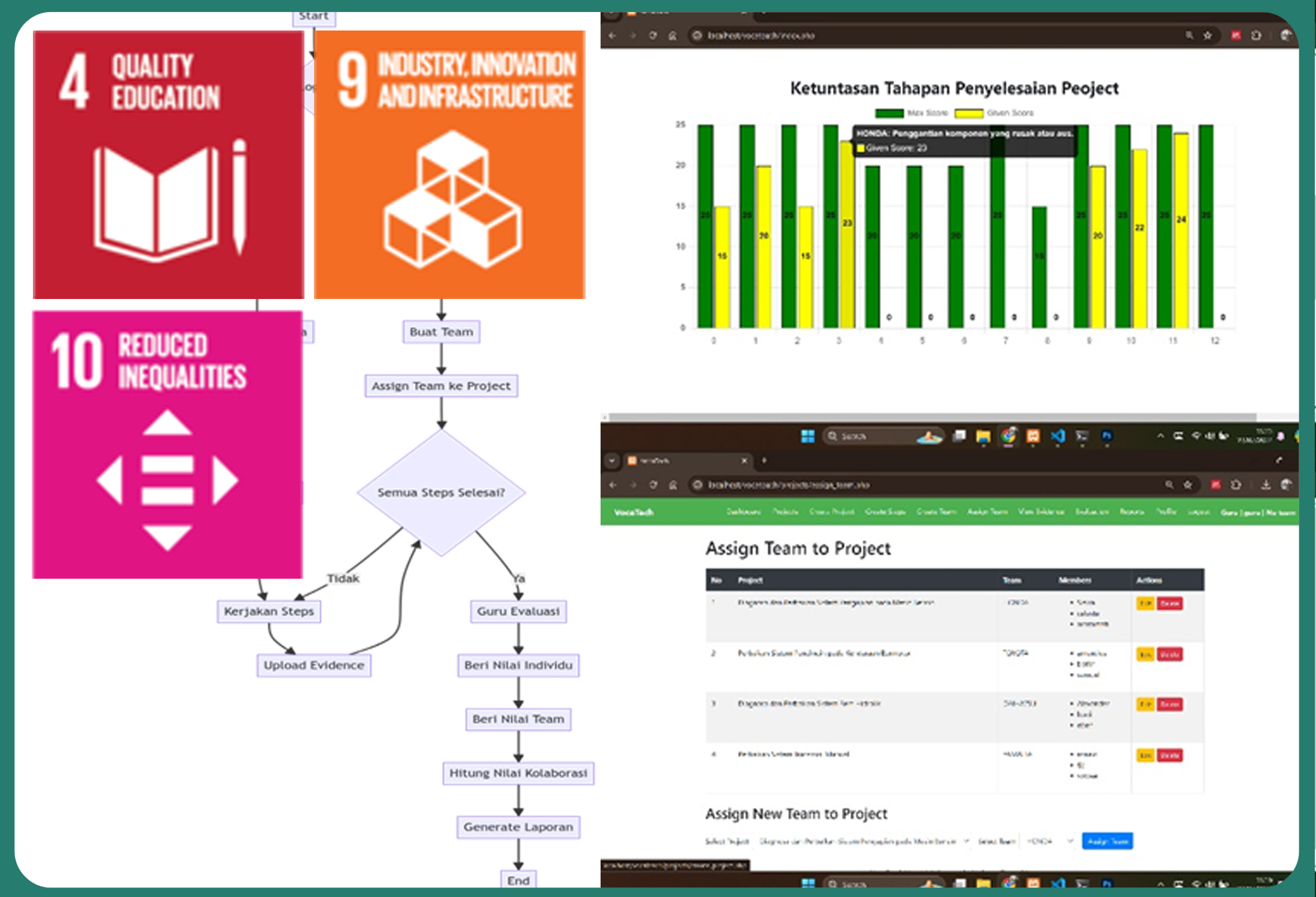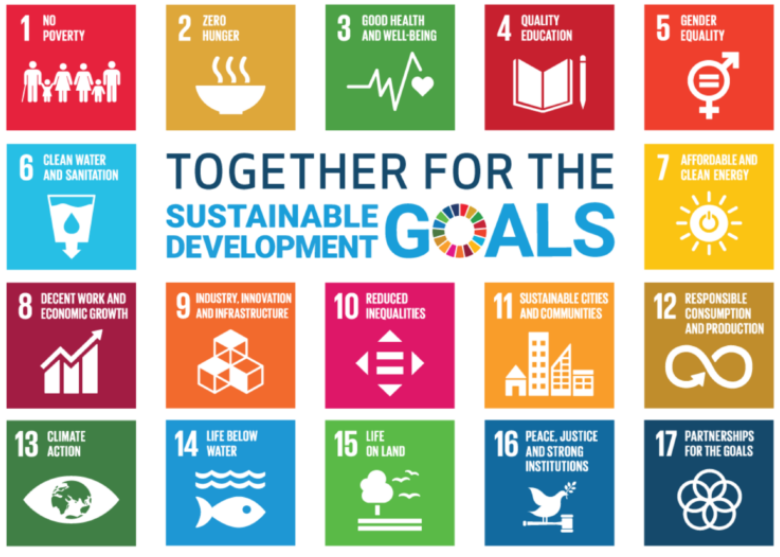Empowering Remote Vocational Schools with VocaTeach to Bridge Skills Gaps in the Era of Industry 4.0 and Society 5.0
DOI:
https://doi.org/10.24036/javit.v5i1.225Keywords:
Project-Based Learning, Vocational Education, Automotive Training, Web Application, Digital Assessment, Industry 4.0, Society 5.0Abstract
This study presents the development and implementation of VocaTeach, a web-based application designed to enhance project-based learning in the context of automotive vocational education. Motivated by the growing need to align vocational training with Industry 4.0 competencies, VocaTeach integrates digital project management, collaboration tools, and a comprehensive evaluation system to support both teachers and students in managing complex, real-world automotive tasks. The system was developed using an Agile methodology and deployed at SMK Swasta Pembda Nias, a vocational school in a geographically remote region. A mixed-method approach was employed, combining surveys, interviews, and usage analytics to assess the platform’s effectiveness. Results showed a significant increase in student engagement (85%), peer collaboration (150% rise in interactions), and improved academic outcomes, including an 18% gain in theoretical test scores. Teacher workload decreased by up to 30%, reflecting improved efficiency in project supervision and assessment. Statistical analysis confirmed the significance of these improvements (p < 0.05) with a large effect size (Cohen’s d = 0.8). Qualitative data reinforced these findings, with students reporting enhanced motivation and perceived relevance of learning tasks, while teachers highlighted improved structure and fairness in assessment. The study concludes that VocaTeach is a viable and scalable digital innovation for vocational education, especially in underserved regions. Future research is recommended to explore integration with Industry 5.0 technologies and to evaluate long-term impacts on career readiness and skill mastery.
Downloads
References
Zhangxiuwen and H. N Krishnasamy, “Exploring the Significance and Contribution of Vocational Education & Training in Meeting the Industrial Development Needs in China,” Int. J. Soc. Sci. Bus. Manag., vol. 2, no. 01, pp. 26–42, Feb. 2024, https://doi.org/10.59021/ijssbm.v2i01.82.
Q. Wu, “The Role of Vocational Education in Addressing Labor Shortages in Aging China,” Law Econ., vol. 3, no. 11, pp. 37–43, Nov. 2024, https://doi.org/10.56397/LE.2024.11.06.
G. Spöttl and L. Windelband, “The 4th industrial revolution–its impact on vocational skills,” J. Educ. Work, vol. 34, no. 1, pp. 29–52, Jan. 2021, https://doi.org/10.1080/13639080.2020.1858230.
M. C. Tavares, G. Azevedo, and R. P. Marques, “The Challenges and Opportunities of Era 5.0 for a More Humanistic and Sustainable Society—A Literature Review,” Societies, vol. 12, no. 6, p. 149, Oct. 2022, https://doi.org/10.3390/soc12060149.
A. G. Kravets, A. A. Bolshakov, and S. Maxim, “Society Challenges and Solution,” Springer Cham, vol. 416, pp. X, 416, 2022, https://doi.org/10.1007/978-3-030-95112-2.
C. De Villiers, “The Impact of Society 5.0 on Curriculum Development in Higher Education,” J. Ethics High. Educ., vol. 4, no. 4, pp. 1–25, Jul. 2024, https://doi.org/10.26034/fr.jehe.2024.5953.
K. Rana and N. Khatri, “Automotive intelligence: Unleashing the potential of AI beyond advance driver assisting system, a comprehensive review,” Comput. Electr. Eng., vol. 117, p. 109237, Jul. 2024, https://doi.org/10.1016/j.compeleceng.2024.109237.
L. A. Curiel-Ramirez, R. Bautista-Montesano, R. Galluzzi, J. Izquierdo-Reyes, R. A. Ramírez-Mendoza, and R. Bustamante-Bello, “Smart Automotive E-Mobility—A Proposal for a New Curricula for Engineering Education,” Educ. Sci., vol. 12, no. 5, p. 316, Apr. 2022, https://doi.org/10.3390/educsci12050316.
K. Jothimani, S. Hemalatha, and K. Karthikeyan, “The futuristic trends for modern electric vehicles,” Artif. Intell. Mod. Electr. Veh. Smart Grid Syst. Fundam. Technol. Solut., pp. 441–476, Jan. 2024, https://doi.org/10.1016/B978-0-443-23814-7.00016-X.
Y. Zhang and B. Li, “Assessing the Efficacy of Project-Based Learning in Higher Vocational English Courses for Developing Practical Communication Skills,” J. Ecohumanism, vol. 3, no. 7, pp. 1660–1670, 2024, https://doi.org/10.62754/joe.v3i7.4330.
P. Nilsook, P. Chatwattana, and T. Seechaliao, “The Project-based Learning Management Process for Vocational and Technical Education,” High. Educ. Stud., vol. 11, no. 2, p. 20, 2021, https://doi.org/10.5539/hes.v11n2p20.
F. Hanif and A. Abdurrahman, “Enhancing 21 St-Cetury Skills Through Project-Based Learning: Isights from Vocational Education in Egypt,” J. Educ. J. Educ. Stud., vol. 9, no. 2, pp. 92–103, Dec. 2024, https://doi.org/10.30983/EDUCATIVE.V9I2.8574.
S. Kikomelo, “Exploring Barriers to the Implementation of Problem-Based Learning Pedagogy in Ordinary Secondary School Mathematics in Tanzania,” Account. Bus. Rev., vol. 16, no. 2, pp. 148–165, Oct. 2024, https://doi.org/10.59645/ABR.V16I2.343.
W. Phinla, W. Phinla, and N. Mahapoonyanont, “Challenges and innovations in developing a social studies curriculum for 21st-century learners in small schools,” vol. ISSN. pp. 5–12, 2024. Accessed: Jul. 02, 2025. [Online]. Available: https://philpapers.org/rec/PHICAI-6.
M. Zorzetti, I. Signoretti, L. Salerno, S. Marczak, and R. Bastos, “Improving Agile Software Development using User-Centered Design and Lean Startup,” Inf. Softw. Technol., vol. 141, p. 106718, Jan. 2022, https://doi.org/10.1016/j.infsof.2021.106718.
I. Siddique, “A Framework for Agile Requirements Engineering in Large-Scale Projects,” SSRN Electronic Journal. Oct. 31, 2024. https://doi.org/10.2139/ssrn.4908503.
M. Snoeck and Y. Wautelet, “Agile MERODE: a model-driven software engineering method for user-centric and value-based development,” Softw. Syst. Model., vol. 21, no. 4, pp. 1469–1494, Aug. 2022, https://doi.org/10.1007/S10270-022-01015-Y.
A. Saad and S. Zainudin, “A review of teaching and learning approach in implementing Project-Based Learning (PBL) with Computational Thinking (CT),” Interact. Learn. Environ., Nov. 2024, https://doi.org/10.1080/10494820.2024.2328280.
C. Zhong and K. Lyu, “Scaffolding Junior Middle School Students’ Engagement in Online Project-based Learning During the COVID-19 Pandemic: A Case Study from East China,” SAGE Open, vol. 12, no. 4, Oct. 2022, https://doi.org/10.1177/21582440221131815.
P. Gu, J. Wu, Z. Cheng, Y. Xia, M. Cheng, and Y. Dong, “Scaffolding self-regulation in project-based programming learning through online collaborative diaries to promote computational thinking,” Educ. Inf. Technol., pp. 1–25, Feb. 2025, https://doi.org/10.1007/s10639-025-13367-1.
S. Dong, R. Zhi, and F. Gan, “Integrating Robotics in Art Education: Leveraging Constructivist and Experiential Learning Frameworks to Enhance Cognitive Development, Problem-Solving Skills and Collaboration Among Diverse Learners,” Eur. J. Educ., vol. 60, no. 2, p. e70114, Jun. 2025, https://doi.org/10.1111/ejed.70114.
U. C. Okolie, B. N. Oluka, F. B. Oluwayemisi, B. A. Achilike, and C. Marcel Ezemoyih, “Overcoming obstacles to collaborative learning practices: a study of student learning in higher education-based vocational education and training,” Int. J. Train. Res., vol. 20, no. 1, pp. 73–91, Jan. 2022, https://doi.org/10.1080/14480220.2021.1965904.
S. Alirezabeigi and M. Decuypere, “Evaluating datafied time: exploring the multiple temporalities of teachers’ work with digital assessment,” Crit. Stud. Educ., Mar. 2025, https://doi.org/10.1080/17508487.2025.2451886.
T. ALKursheh, “Higher Tertiary Education Perspectives: Evaluating the Electronic Assessment Techniques of the Blackboard Platform for Fairness and Reliability,” Innoeduca. Int. J. Technol. Educ. Innov., vol. 10, no. 1, pp. 144–165, Jun. 2024, https://doi.org/10.24310/ijtei.101.2024.17813.
A. S. George and A. S. H. George, “Towards a Super Smart Society 5 . 0 : Opportunities and Challenges of Integrating Emerging Technologies for Social Innovation Partners Universal International Research Journal ( PUIRJ ) Towards a Super Smart Society 5 . 0 : Opportunities and Challenges of,” Partners Univers. Int. Res. J., vol. 3, no. June, pp. 0–29, Jun. 2024, https://doi.org/10.5281/ZENODO.11522048.
T. Barua, ; Md, and A. Rahman, “A Systematic Literature Review of User-Centric Design in Digital Business Systems Enhancing Accessibility, Adoption, and Organizational Impact,” Am. J. Sch. Res. Innov., vol. 2, no. 02, pp. 193–216, Apr. 2023, https://doi.org/10.63125/36W7FN47.
C. G. Demartini, L. Sciascia, A. Bosso, and F. Manuri, “Artificial Intelligence Bringing Improvements to Adaptive Learning in Education: A Case Study,” Sustain., vol. 16, no. 3, p. 1347, Feb. 2024, https://doi.org/10.3390/su16031347.
P. S. Aithal and S. Aithal, “How to Empower Educators through Digital Pedagogies and Faculty Development Strategies,” SSRN Electron. J., Dec. 2024, https://doi.org/10.2139/ssrn.4674876.
O. Ijiwade and D. Alonzo, “Teacher Perceptions of the Use of a Computer-Adaptive Test for Formative Purposes: Typologies of Practices,” Int. J. Instr., vol. 16, no. 2, pp. 887–908, 2023, https://doi.org/10.29333/iji.2023.16247a.
Y. Zhang, X. Sun, and J. Yu, “Transformative Technologies in the Evaluation of a Vocational Education System,” J. Web Eng., vol. 23, no. 2, pp. 275–298, 2024, https://doi.org/10.13052/JWE1540-9589.2324.
M. Sofyan, M. Barnes, and I. Finefter-Rosenbluh, “Fair assessment as an aspect of effective teaching: teachers’ and students’ perceptions of and positioning within assessment practices in Indonesian vocational higher education,” J. Vocat. Educ. Train., vol. 76, no. 4, pp. 795–817, Aug. 2024, https://doi.org/10.1080/13636820.2022.2098170.

Downloads
Published
How to Cite
Issue
Section
License
Copyright (c) 2025 Yulianus Zega

This work is licensed under a Creative Commons Attribution 4.0 International License.










